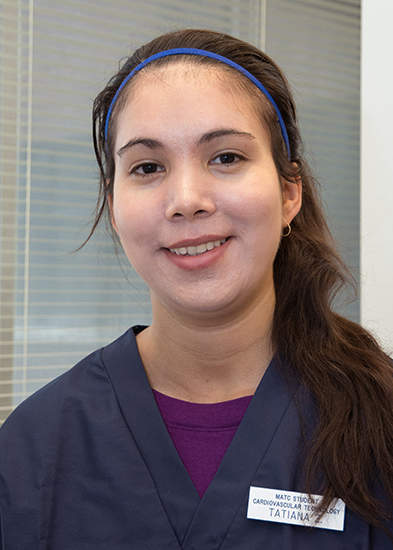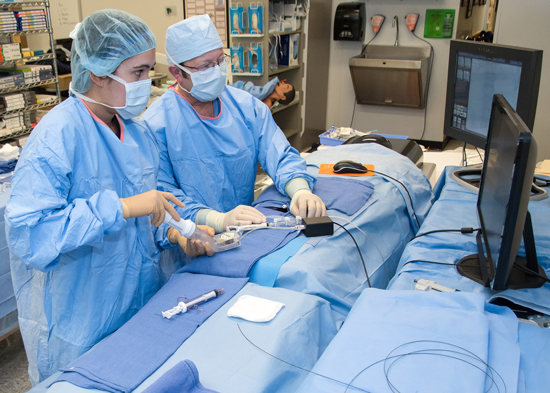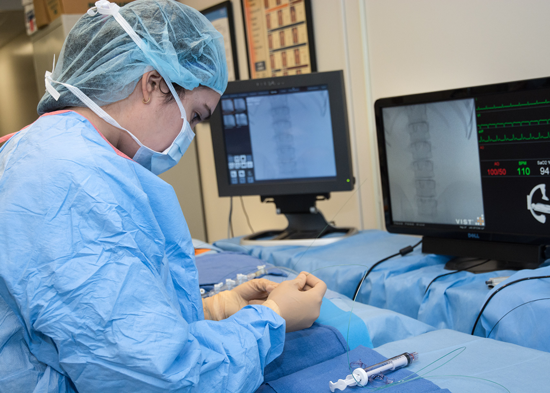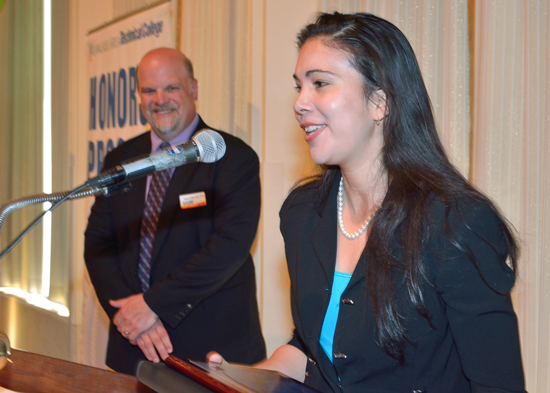
Tatiana Zaldua
Two brushes with heart health issues as a teen piqued Tatiana Zaldua's interest enough to lead her to investigate careers in working with heart patients. Several years later, she discovered that MATC's cardiovascular technology associate degree program was the perfect path to the career she wanted.
When she was in high school, her mother began experiencing heart problems, so Zaldua researched ways to help her adopt a healthier lifestyle. She also realized her own pulse was very low, a condition called bradycardia. She investigated and learned that in her case, bradycardia was a non-life threatening side effect of her athletic lifestyle. Exploring both situations and learning how greatly the heart affects the functioning of the rest of the body intrigued her.
During her years as a student at Milwaukee's Rufus King High School, she served as the president of the Medical Science Club and led blood drives at the school. At the same time, she began to research careers in the medical field. She decided to study to become a cardiac nurse, and enrolled at Alverno College after graduating from high school in 2009.

Zaldua and Erwin Wuehr, coordinator for MATC's cardiovascular technology and anesthesia technology associate degree programs, work in the lab at the Downtown Milwaukee Campus.
Wanted Direct Route to Working with Heart Patients
Zaldua spent a year in Alverno's registered nursing bachelor's degree program. Her studies included shadowing nurses. "I realized then that if I took the nursing route, I'd have to start in a more general job," she said. "It might take five to seven years working in an intensive care unit before I could work in a catheterization lab as a nurse."
Then she discovered MATC's associate degree program in cardiovascular technology, which allows students to choose the invasive (cardiac catheterization lab) or non-invasive (echocardiography) subspecialty. Both paths offer extensive hands-on instruction in MATC's labs, multiple clinical placements and lead directly to working with heart patients.
I wouldn't be the same person if I'd gone to a different college. Everybody here supports you all the way. I wouldn't have been as prepared for my future coming from a different kind of college environment.
Zaldua transferred to MATC in 2012, and began taking general studies courses. She was accepted into MATC's cardiovascular technology program, beginning program-specific courses in January 2015. Zaldua chose the invasive subspecialty which allows her to work in a clinical setting assisting with a variety of procedures, including cardiac catheterizations, stent and pacemaker placement and repairing holes such as shunts in hearts. She currently has clinicals two days a week in the Cardiac Catheterization Laboratory at Froedtert & the Medical College of Wisconsin while she takes 16 credits of coursework at MATC. She will continue her Catheterization Lab rotatation four days a week in the spring semester and will begin her Electrophysiology Laboratory rotation. In electrophysiology labs, patients have the opportunity to have their arrhythmia (irregular heartbeat) tested, diagnosed and treated.
Enjoys the Intensity of Program
"The cardiovascular technology program is very intense," Zaldua said. She explained that she and her classmates function much like a family - studying together, supporting each other and eating meals together.
She also enjoys the teamwork aspect of her placement at Froedtert & the Medical College of Wisconsin, and likes working with patients. "You get so much hands-on experience with this program. You're in charge of someone's life. We set everything up for the doctors and create a sterile field for the procedures. In acute cases, it's 'all hands on deck.' We work together with doctors and fellows as a team."

Zaldua enjoys the hands-on approach to training in MATC's cardiovascular technology associate degree program.
Erwin Wuehr, coordinator for MATC's cardiovascular technology and anesthesia technology programs, speaks highly of Zaldua. "Tatiana has excelled in the cardiovascular technology program beginning from the first day of class," Wuehr said. "She has shown herself to be an energetic student who is always striving for more knowledge. In her clinical rotations, she has demonstrated an eagerness and enthusiasm that more than impresses her clinical instructors. She will make a great cardiovascular technologist after she graduates."
Serves as MATC Student Ambassador
In addition to being very happy with the hands-on aspect of her MATC education, she also is very pleased with MATC's affordability. Tuition and fees are lower than at many other institutions, she explained. Zaldua also was impressed with the amount of financial aid and scholarships she has received at MATC.
One of those scholarships came with the honor of being selected to serve as MATC's Student Ambassador from April 2015-April 2016. Each institution in the Wisconsin Technical College System appoints an ambassador who speaks to groups about the importance of technical college education. Ambassadors represent their colleges in making presentations to business and education leaders and to the college's board of directors. Zaldua also performs duties at honors ceremonies.
She enjoys representing both MATC and the cardiovascular technology program. "I wouldn't be the same person if I'd gone to a different college," Zaldua said. "Everybody here supports you all the way. I wouldn't have been as prepared for my future coming from a different kind of college environment."

Zaldua speaks at the May 2015 Lamp of Knowledge ceremony in her role as Student Ambassador while Trevor Kubatzke, MATC vice president for student services, looks on.
Future Holds Many Possibilities
Currently, Zaldua is certified cardiac technician, which she earned by passing the Cardiovascular Credential International examination.
There is a widespread shortage of invasive cardiovascular specialists, Zaldua said. After she graduates in May 2016 and passes her registry exams, she will become a registered cardiovascular invasive specialist and/or an electrophysiologist specialist. She is thinking of many possibilities such as working the Milwaukee area, working out of state, or becoming a "traveler" with a service that matches medical personnel in short-term placements throughout the country. She also is considering continuing her studies at Valencia College in Orlando to earn a bachelor's degree in cardiopulmonary sciences. She is excited to note that Valencia will accept all her MATC credits toward the bachelor's degree.
Zaldua is happy with the many possibilities open to her. She said she plans to take her grandmother's advice: "If you follow your heart, you'll be on the right path."
For more information on MATC's cardiovascular technology associate degree program, visit: http://www.matc.edu/health_sciences/degrees/cardiovascular-technology.cfm

